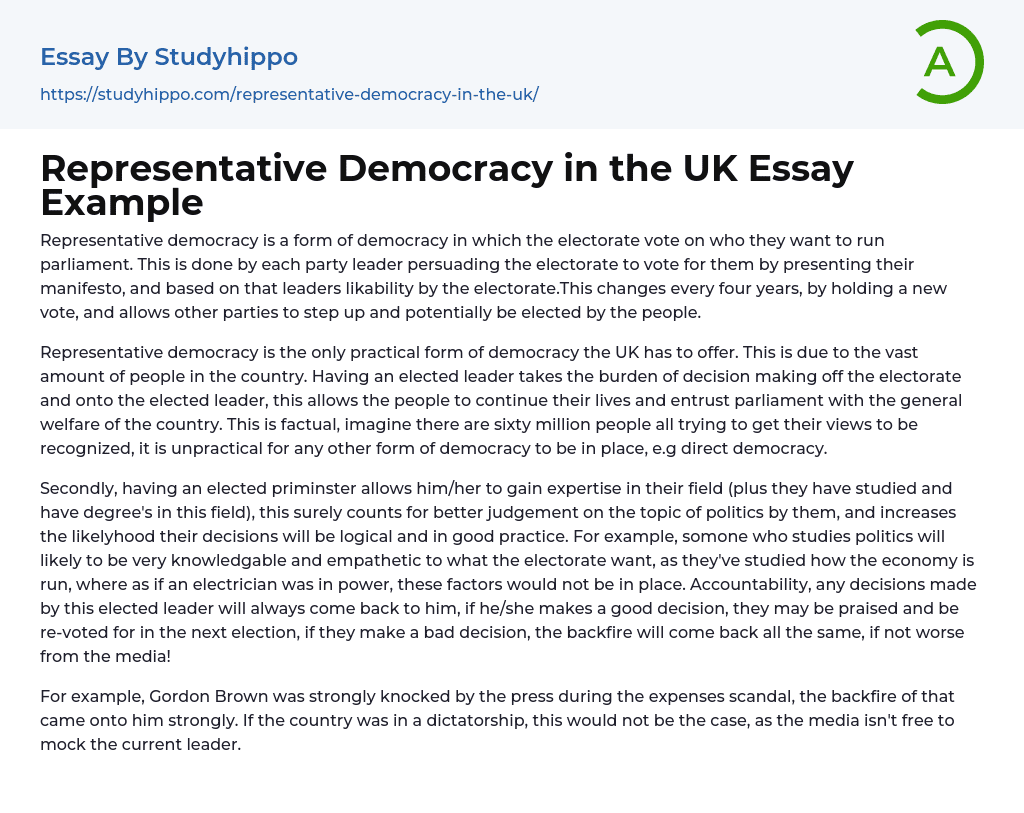Representative democracy is a form of democracy in which the electorate vote on who they want to run parliament. This is done by each party leader persuading the electorate to vote for them by presenting their manifesto, and based on that leaders likability by the electorate.This changes every four years, by holding a new vote, and allows other parties to step up and potentially be elected by the people.
Representative democracy is the only practical form of democracy the UK has to offer. This is due to the vast amount of people in the country. Having an elected leader takes the burden of decision making off the electorate and onto the elected leader, this allows the people to continue their lives and entrust parliament with the general welfare of the country. This is factual, imagine there are sixty mill
...ion people all trying to get their views to be recognized, it is unpractical for any other form of democracy to be in place, e.g direct democracy.
Secondly, having an elected priminster allows him/her to gain expertise in their field (plus they have studied and have degree's in this field), this surely counts for better judgement on the topic of politics by them, and increases the likelyhood their decisions will be logical and in good practice. For example, somone who studies politics will likely to be very knowledgable and empathetic to what the electorate want, as they've studied how the economy is run, where as if an electrician was in power, these factors would not be in place. Accountability, any decisions made by this elected leader will always come back to him, if he/she makes a good decision, they
may be praised and be re-voted for in the next election, if they make a bad decision, the backfire will come back all the same, if not worse from the media!
For example, Gordon Brown was strongly knocked by the press during the expenses scandal, the backfire of that came onto him strongly. If the country was in a dictatorship, this would not be the case, as the media isn't free to mock the current leader.
- Federal government essays
- Armed Forces essays
- Confederate States Of America essays
- Federal Government Of The United States essays
- Fourteenth Amendment To The United States Constitution essays
- Governance essays
- Parliament essays
- Politics essays
- Jurisdiction essays
- Bureaucracy essays
- Separation Of Powers essays
- Congress essays
- President essays
- United States Congress essays
- Non-Commissioned Officer essays
- Appeal essays
- Revenge essays
- Corporate Governance essays
- Public Service essays
- Income Tax essays
- Supply essays
- Red Cross essays
- Democracy essays
- State essays
- Liberty essays
- Absolutism essays
- Reform essays
- Republic essays
- John Marshall essays
- Bourgeoisie essays
- Developed Country essays
- Elections essays
- International Relations essays
- Left-Wing Politics essays
- Monarchy essays
- Political Corruption essays
- Political Party essays
- Political Science essays
- Sovereign State essays
- United Nations essays
- World Trade Organization essays
- Contras essays
- Dictatorship essays
- Foreign policy essays
- Monarch essays
- Corruption essays
- Foreign essays
- Democratic Party essays
- European Union essays
- President Of The United States essays




